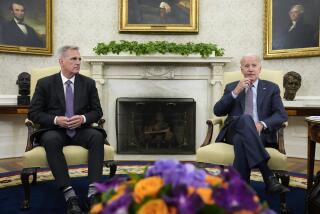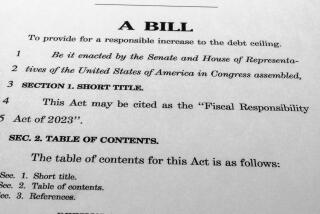Greece, the Euro, and the banks: how a small crisis became a big one

Pro-Euro demonstrators rally in front of the parliament building in Athens on Tuesday, ahead of a weekend referendum.
- Share via
It shouldn’t escape anyone’s notice that while discussions of the Greek crisis employ the vocabulary of economics--debt, default and deficits are the defining terms--the real concerns expressed by those closest to the unfolding disaster are political.
In purely economic terms, a Greek default or exit from the Eurozone would be almost a nonevent for the rest of Europe or the world: With an estimated gross domestic product of about $250 billion, the country’s economy is about the size of Connecticut or Louisiana. The default by Greece on its international debt, which formally occurred Tuesday at midnight Central European Time, 3 p.m. Pacific, won’t matter much to the bottom line of such major creditors as the European Central Bank.
By the same token, writes economist Anil Kashyap of the University of Chicago, “the money to save Greece could easily be found.” By itself, a Greek default will be scarcely a hiccup for the U.S. economy. (That doesn’t mean that the crisis won’t give the U.S. stock market episodes of the vapors, as it did Monday.)
What has hardened the positions of the ECB and other leaders of the European Community, however, are the political repercussions of a Greek exit from the euro. Up to now, the Eurozone has been regarded as sacrosanct--there are no established provisions for a country, once in the zone, to leave it. If Greece cracks open the door, will other countries that consider themselves disadvantaged by the single currency, such as Spain and Italy, follow it out? Those are much bigger economies, and keeping them in would involve higher costs than the European Community could sustain.
Still, the brinkmanship that has developed over the Greek crisis points to some inescapable truths about monetary unions. As we observed in 2012, during the previous standoff over the Greek role in the European economy, maintaining monetary union without real fiscal or political union eventually imposes unsustainable costs on someone — in this case Germany, which ends up footing most of the bill.
“The bill payer eventually insists on changes to lower the bill, and those changes typically fall hardest on the workers stuck at the bottom of the economic pyramid,” we wrote. “Bondholders and other investors who reaped profits in the good years will generally manage to protect their investments when things turn down, often by liquidating labor costs through the imposition of wage freezes and layoffs.”
That’s what’s been happening in Greece over the last five years, during which the country’s European partners have insisted on draconian austerity measures to bring down its deficit and protect its bondholders. These measures have fallen on Greek workers, who are understandably fed up.
As Nobel economist Joseph Stiglitz, an advisor to the Greek government in 2010, observed recently, the economic effects of the austerity program then imposed on Greece by the ECB, the European Commission and the International Monetary Fund have been dismal. GDP has fallen 25%, and unemployment among the young exceeds 60%. “I can think of no depression, ever, that has been so deliberate and had such catastrophic consequences,” he wrote.
It’s common to blame the succession of Greek regimes dating back well before 2010 for the succession of fiscal and economic crises, and certainly they deserve plenty of blame. They fiddled the books, making the country’s fiscal condition look better than it was, and resisted reasonable fiscal measures, including sealing leaks in the tax-collection system.
The current prime minister, Alexis Tsipras, displayed incompetence by calling a referendum for this weekend over the terms of a European bailout, says UC Berkeley economist Barry Eichengreen, an expert on international monetary systems. “The decision to call a referendum in midstream only heightened uncertainty,” he writes. “It was a transparent effort to evade responsibility. It was the action of leaders more interested in retaining office than in minimizing the cost to the country of the crisis.”
Yet “this incompetence pales in comparison” to that of the so-called troika of creditors, the EC, ECB and IMF, he adds. To understand why, it’s proper to take a quick look at the recent history of Greek bailouts.
The first came in 2010, when Greece was on the verge of defaulting on huge loans owed to private banks, mostly in France and Germany. The bailout money came from the IMF, but most of its simply passed through Greek hands on the way to the banks. “The new lending was advertised by politicians across Europe as rescue for Greece,” writes Kashyap. “But it was at least as much a deal...for the banks and other owners of Greek debt to avoid a default.”
The price of the bailout was drastic austerity reforms. These tended to fall disproportionately on lower-income Greeks through reductions in “public sector wages and social benefits,” the IMF conceded later. No debt was written off, so the government’s debt burden remained unchanged. Another bailout followed in 2012.
By 2014, Greece seemed to have turned a corner. It was running a surplus, except for interest payments on the debt: “Few countries have accomplished anything like what the Greeks have achieved in the last five years,” writes Stiglitz.
But it was too late. The toll of the rescue program finally prompted the public to vote in a new government committed to ending austerity. Under Tsipras, the new regime reopened talks with the creditors to roll back some of the mandated spending cuts and write off some of the debt.
The standoff underscores the bad decisions made in the past. Many economic observers say the troika should have arranged a debt restructuring in 2010, when resolving the crisis would have been relatively low-cost. The troika, writes Eichengreen, continued to resist a writedown this year, even though it was “the obvious concession to Mr Tsipras & Company. The cost would have been small. Pretending instead that Greece’s debts could be repaid hardly enhanced their credibility.”
What now? The creditor institutions and the Tsipras government aren’t necessary that far apart--at least not so far that no compromise is possible. It’s in Greece’s interest to signal a willingness to negotiate, and the European Community’s interest to give a little, too. But now the referendum is in the way.
A “no” vote to reject the troika’s terms means Greece almost certainly defaults and is barred from the international credit markets, at least for a time. A sharp recession would follow. The government would probably issue IOUs to government workers, retirees and suppliers, but these will circulate at a discount to the euro, which most people will still regard as hard currency. A “yes” vote means the country remains in the Eurozone, but under continued austerity.
Political observers believe that public sentiment still favors remaining in the Eurozone. As part of the European Union, Kashyap observes, “Greek citizens can travel freely and work anywhere within Europe. Greek goods are also allowed to be sold without being subject to tariffs.”
An exit would have dire near-term economic consequences, but might also give the Greeks the ability to manage their crisis on their own terms, by themselves. There’s a long tradition of countries extricating themselves from monetary straitjackets when they become suicidally confining, dating back to Franklin Roosevelt’s decision to take the U.S. off the gold standard in 1933, when he needed a firmer hand to manage recovery from the Great Depression.
Some of FDR’s aides were unnerved by the uncertainty of life without the tether of gold. “This is the end of Western civilization,” blurted his budget director, Lewis Douglas. But history shows that it was the right move.
Even if Greece stays in the euro, its monetary partners would need to take a lesson from the near-death experience. The economies of Greece and Germany are hopelessly divergent, yoked only by the dream of economic union. But if it costs one country so much simply to keep the bankers and bondholders of others solvent, the likelihood is that this crisis won’t be the last.
Keep up to date with the Economy Hub. Follow @hiltzikm on Twitter, see our Facebook page, or email michael.hiltzik@latimes.com.
More to Read
Inside the business of entertainment
The Wide Shot brings you news, analysis and insights on everything from streaming wars to production — and what it all means for the future.
You may occasionally receive promotional content from the Los Angeles Times.










